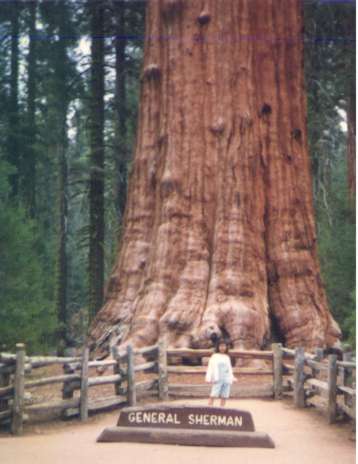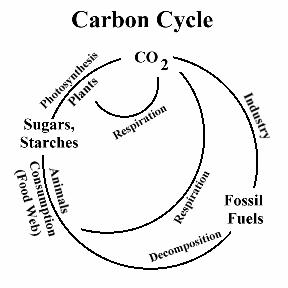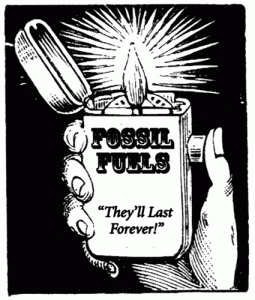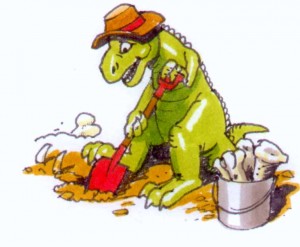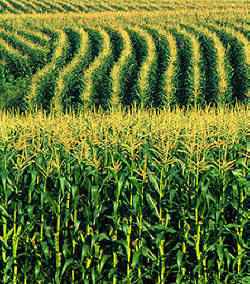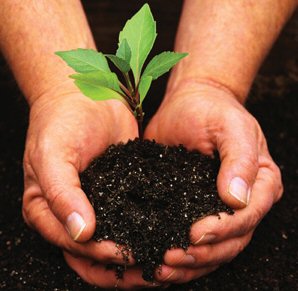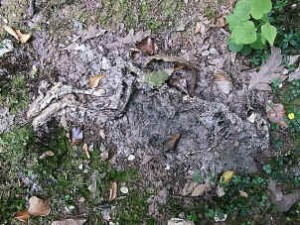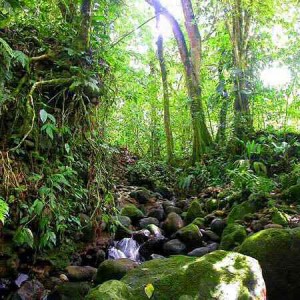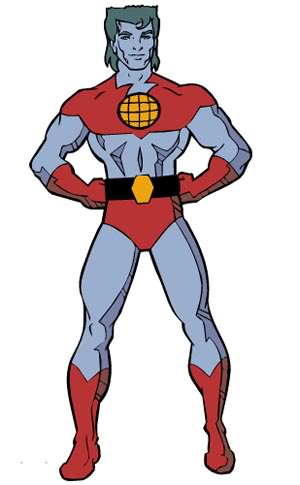One of my favorite areas of study in college was Dendrology, which is the study of trees. Trees are just cool. They are absolutely mammoth plants with an extremely delicate infrastructure. There will be an article on my favorite tree in the future, you can bet on that, but for now I am just going to talk about how trees come to be. Take for instance, the tree pictured at the start of the article, General Sherman. General Sherman is a giant sequoia, (Sequoiadendron giganteum) tree. This bad boy is over 275 feet tall, which is 20 feet short of the entire height of the Statue of Liberty in NY. General Sherman weighs over 6100 tons, and is 36.5 feet wide at the bottom, which, coincidentally, is larger than my meager apartment. How did this tree get to be so big? Time, is the real answer. General Sherman is estimated to be over 2300 years old. Think about that for a second. This tree was around before christianity even existed. This tree started its growth before the world was considered round, heck the civilized world didn’t even know that the Americas even existed at that point. This tree has seen everything from ancient history to world wars, to civil wars, and it has still weathered on. One of the often overlooked facts about trees is how they grow, and what makes them grow to be so big. General Sherman, which weighs 6100 tons, is made almost entirely up of air.
Ok, now you lost me.. trees are made of air?
Well.. as crazy as it sounds, it is true. Trees are made up almost entirely of carbon, which comes from the Carbon Dioxide, or CO2 that makes up around 20% of the air that we breathe. This is the same demonic gas that makes up a large part of car emissions. Plants eat that stuff, and the funny thing is that the CO2 spewing from your car’s tailpipe used to be plants, trees, and little critters. There is a reason they call oil and gasoline fossil fuels. Oil is made up of ancient plant and animal matter that was buried underneath swamps and oceans, and over millions of years, the heat and pressure turned that carbon matter into oil.
Wait… so how does burning plant matter hurt the environment?
This is the crux of the matter my friends. Fossil fuels are using carbon that has been long sequestered away from the rest of the world underground. By burning this oil and releasing the CO2 back into the air, we are adding to the environment. This is different than say, burning wood. The wood that you burn used up the CO2 in the current air environment, so releasing that carbon back into the air doesn’t really have that huge an effect. It is only hundreds of years old (or in General Sherman’s case, thousands). Burning those fossil fuels take that excess carbon that is stored in the earth and add it to our air, where burning ethanol, biofuels, or wood do not. Biofuels just cycle the carbon that is already in the system.
But… fossil fuels were part of the environment before right?
True. One thing that is very important to think about is that we are not adding any more carbon to the earth. Our planet is an island in space, and we are not going to get any more or less out of it. Maybe a few asteroids here or there will add some minerals, but in general the amount of carbon found in the earth is fixed. Many people have the misconception that we are creating more and more of this damaging CO2, when in fact we are just cycling carbon that we have always had. When you think about it, the very same carbon particles that make up you, and the CO2 around us, were probably at one point breathed in by dinosaurs or some other ancient life form. You are breathing dinosaur air! The problem comes when you think about climate change. The climate of the dinosaur era was very warm and jungle-like. This was why there were so many plants and animals to make that oil underground. Many scientists theorize that because we are using these fossil fuels, we are adding more CO2 into an environment that can’t support it. Millions of years ago, when the dinosaurs roamed the earth, there were many more trees and other plants to absorb the extra CO2. Their environment just had more carbon in it. Right now, we don’t have the jungles and massive oceans bursting with life to absorb that extra CO2. We are adding more and more of that Dinosaur era CO2 into the air by burning oil.
Ok, so fossil fuels are bad, right?
Correct, but we really don’t know how much difference we are making to the environment right now. Signs are not good and it is clear that the amount of CO2 in the air is rising much more rapidly than before. Many think this rapid climate change has a lot to do with the amount of fossilized carbon we are adding to our system, but we can’t jump to any conclusions. The good news is that we have many alternatives to fossil fuels. Biofuels and Ethanol burn carbon in the same way, but make up for it by using carbon that grew in plants the year before. These plants grew by using the CO2 in the air, so basically Biofuels are just recycling the carbon they use year by year. There is no net gain in carbon this way, as the CO2 released from cars running on biofuels become the plants of tomorrow. (I would like to note that I am not in favor of using biofuels for other reasons unrelated to their carbon emissions).
So.. we should plant more trees then?
And we return to the start. Yes. Trees in forests store about 86% of the carbon above ground and around 73% of the carbon in the soil. Forests are essentially giant air filters. They take the CO2 in the air and convert that into tree mass. Remember General Sherman? He had about 2,000 years to collect all of that CO2 and turn that into wood, which is why he is so gigantic. (Also, Sequoia trees are just huge) Trees also release oxygen as a by-product of taking in that CO2, they take the C, and give back the O2. This is why protecting the forests and rain forests is so important. CO2 is also exchanged by algae in ponds and oceans as well, but trees make up an essential part of the carbon cycle that we can’t live without. I know that I have given the impression that this carbon sequestration is doing a pretty good job of keeping the air at acceptable levels, but things are quickly moving out of balance. Not only are we burning more fossil fuels than ever, releasing long stored carbon into our current cycle, but we are also cutting down rain forests that would help filter out that carbon. The candle is burning at both ends here.
Oh HO! what about decomposition!?
Drat. You got me! Yes, decomposition is a huge factor in how the forest ecosystem works. Trees and animals that die in the forest decompose there as well. This decomposition process releases almost all of the CO2 that was stored in the trees back into the air. A healthy forest actually has nearly no net effect on the overall CO2 in the atmosphere. These forests live and die mostly on their own air. So, just protecting our current forests is not enough to fix everything. There is hope still, because of one little thing.. forests can grow. If there is more CO2 to be had, more trees will grow to use that CO2 up. Back in the dinosaur times, there was so much more carbon cycling on the earth and there were many more plants to deal with that. Right now, we are adding that ancient carbon into our current cycle and, if we let them, the forests will grow large enough to meet the needs of the environment. Mother earth is the queen of balance. (Eat your heart out justice scales lady) If there is more CO2 in the air, more trees will grow to balance that out. (and vice versa) So it is very important to protect our forests and plant more trees!! Additionally, scientists are now researching methods in which we can dispose of these dead trees in the soil. Burying the dead trees and plant matter correctly will have the same effect that those swamps and oceans did millions of years ago. These decaying trees stored in the earth will act very much like how oil stores carbon underground. They would be artificially creating conditions in which carbon could be stored safely underground for millions of years.
Save the rain forest?
Yup. I know it sounds all hippy and tree-hugger of me to say that, but it is true. Not only are we hurting the many hundreds of thousands of diverse species that live there, but we are also changing the content of the air that we breathe. Rain forests in South America alone make up a massive part of that 86% of the carbon on the surface of the earth. Even if you don’t care about the cute little monkeys or birds that will have nowhere to live, you have to care about the air you breathe! Contrary to popular belief, you need that stuff to live. If we continue on this path of clear cutting, we could change the environment in a way that would drastically affect the lives of everyone on the planet. If we are going to use the fossil fuels, we are going to have to face the consequences. I won’t get into it in this article, but small amounts of extra CO2 in the air can drastically change the temperatures of the planet overall. (You don’t want to live in jungle dinosaur times do you? Think of the air conditioning bills!!) If you leave this article knowing one thing, I would hope that you know that the cycle of carbon on this planet is doing a very delicate balancing act, and we must be very careful not to tip the scales too much, or we might end up in a heap of trouble. It is all about balance people. If we want to keep using fossil fuels, we have to start planting more trees.
Planting more trees won’t fix everything will it?
Unfortunately, it will not fix everything, but it certainly wouldn’t hurt. Our entire economy is based upon the consumption of “free” fuel sources. These pools of oil and coal are just sitting in the earth, and all you have to do is take them. It is the easy way to do things. I think that we as humans are capable of doing things the hard way. We are smart, resourceful, and resilient. If we really wanted to, we could move away from these fossil fuels, and become more dependent on renewable energy. I could probably go on a long and labored rant on the inefficiencies of the energy market of today. But I will spare you the hot air. What needs to be done is a long term commitment to change and research. I feel like the tide is turning right now, (especially with the BP spill making oil look yucky) and if we can use our brains and our human ingenuity I am sure we can figure out how to move forward.
